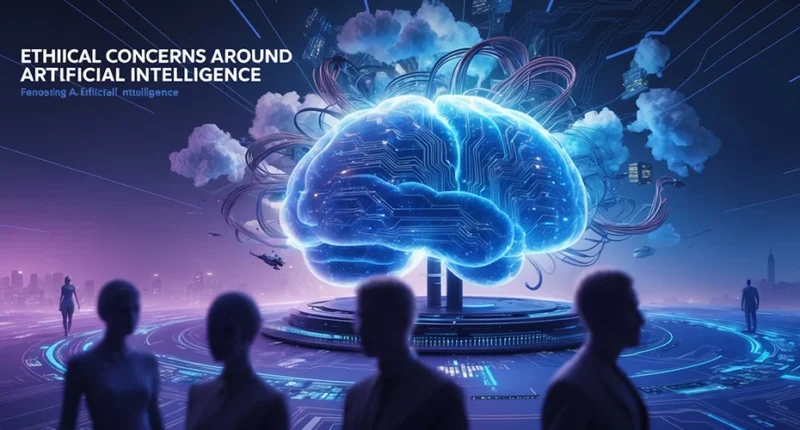Table of Contents
Artificial Intelligence (AI) is rapidly changing the world. From self-driving cars to personal assistants like Siri, AI is becoming a part of everyday life. While AI brings many benefits, it also raises important ethical concerns. These concerns revolve around issues like privacy, job loss, bias, and even the control of AI itself. Let’s explore these ethical challenges and understand how they might impact society.
Privacy and Data Security
One of the biggest ethical concerns with AI is privacy. AI systems collect a lot of data to learn and make decisions. This data often includes personal information, such as your online habits, location, and even your conversations. For example, AI-powered devices like smart speakers or phone assistants listen to what you say and store that information to improve their responses.
The problem is that this data can be misused or hacked. If someone gains access to this personal information, it could lead to identity theft or other types of privacy violations. AI systems need to be designed in ways that protect people’s privacy and ensure that their data is secure.
Job Loss and Automation
Another ethical concern is the impact of AI on jobs. As AI technology advances, many tasks that were previously done by humans are now being automated. For example, AI is already being used in factories, in customer service chatbots, and even in medical diagnoses. This automation can lead to job losses, as machines take over roles that were once filled by workers.
While AI may create new jobs in fields like robotics and data science, there is concern about how quickly people can transition into these new roles. Workers who have spent their entire careers in industries affected by automation might struggle to find new employment opportunities, which can lead to economic inequality and social unrest.
Bias in AI Systems
AI systems are only as good as the data they are trained on. If the data used to teach an AI system is biased, the AI will also be biased. For example, if an AI is trained on data that reflects historical inequalities, it might make unfair decisions. This can be seen in situations like hiring practices, where AI may unfairly favor certain candidates based on biased data.
For instance, studies have shown that AI systems used in hiring processes sometimes favor male candidates over female candidates or people of one ethnicity over others. This is because the data used to train these systems may reflect past hiring patterns that were biased. It’s crucial to ensure that AI systems are trained on diverse and fair data to avoid perpetuating existing biases.
AI in Decision-Making
As AI becomes more involved in decision-making, whether in healthcare, criminal justice, or finance, it raises the question of who is responsible when things go wrong. If an AI makes a mistake that harms someone, who should be held accountable? Is it the company that created the AI, the people who trained it, or the AI itself?
In the healthcare industry, for example, AI is being used to diagnose diseases or recommend treatments. If an AI makes an error and the patient is harmed, it’s not always clear who is responsible for that mistake. Ethical questions like these need to be carefully considered as AI continues to play a bigger role in critical decision-making processes.
The Control of AI
As AI becomes more advanced, there are concerns about how much control we should give machines. Some fear that, in the future, AI could become so powerful that it might operate outside of human control. This is often referred to as the “superintelligence” problem. If AI becomes smarter than humans, it could make decisions that we don’t understand or can’t influence.
There are also concerns about AI being used for malicious purposes, such as creating deepfakes (fake videos or images), spreading misinformation, or even creating autonomous weapons. Ensuring that AI is developed and controlled responsibly is a key challenge in addressing these ethical concerns.
The Need for Regulation
Given these ethical issues, many experts agree that AI needs to be properly regulated. Governments, companies, and research organizations must work together to create laws and guidelines that ensure AI is developed and used ethically. These regulations should address issues like data privacy, transparency, fairness, and accountability.
By putting the right regulations in place, we can help ensure that AI serves society in a positive way and doesn’t cause harm. It’s important that as AI technology continues to evolve, we also evolve our ethical standards and laws to keep up with these changes.
Conclusion
Artificial Intelligence is a powerful tool with the potential to change the world in many positive ways. However, it also brings important ethical concerns that need to be addressed. From privacy and job loss to bias and accountability, these issues need careful consideration as we continue to integrate AI into our daily lives. By being aware of these concerns and taking steps to regulate AI, we can ensure that its benefits are enjoyed by everyone, while minimizing potential harms.











